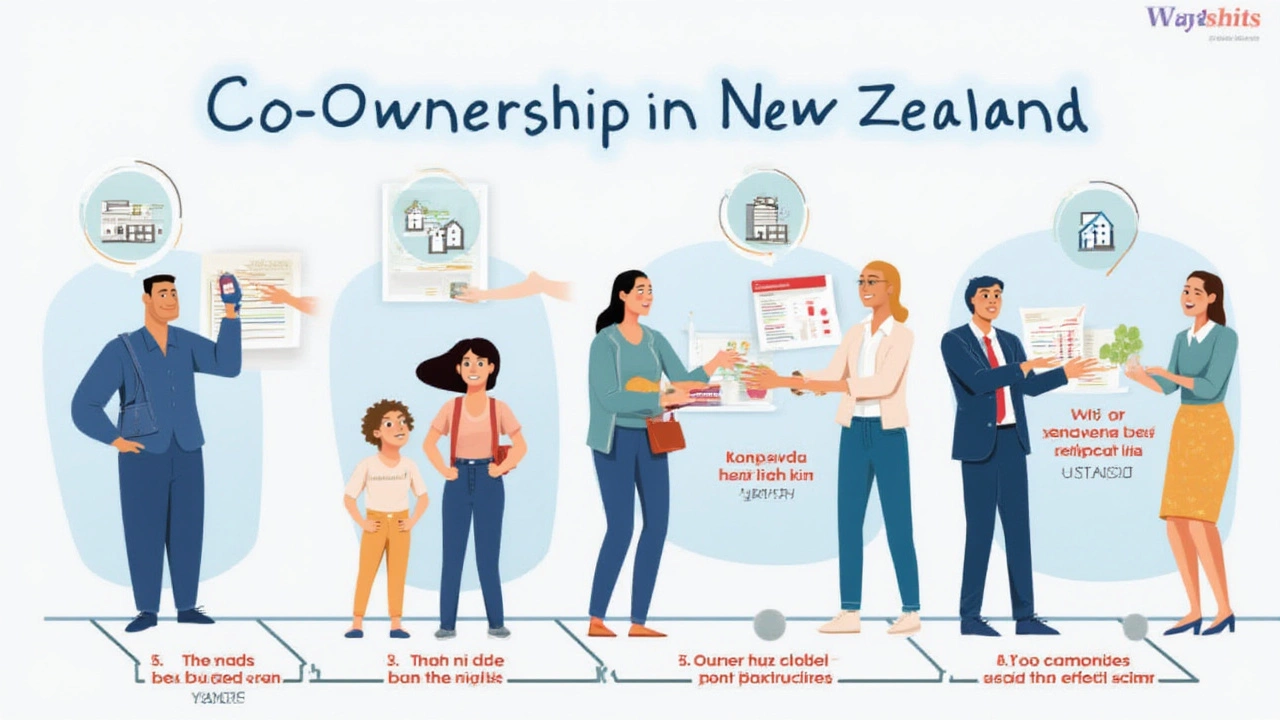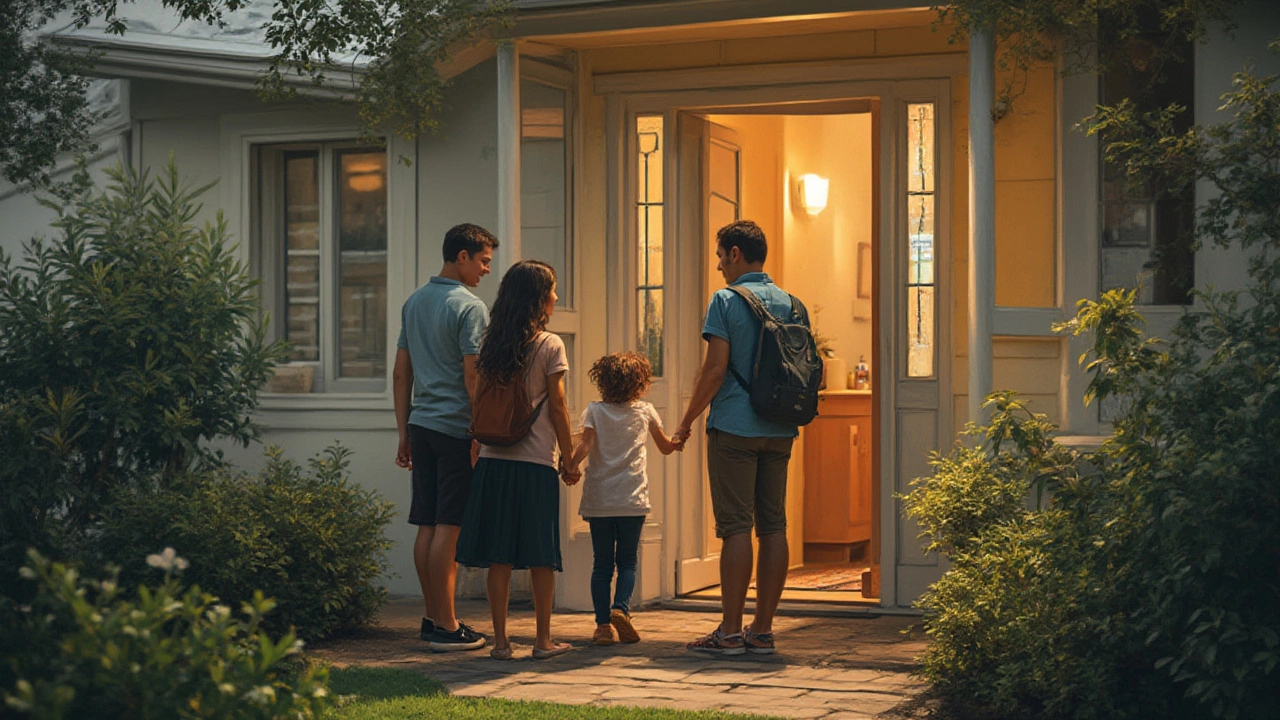You can’t scroll Trade Me or wander your local open home without seeing a property price that makes you wince. For single buyers, it can feel impossible. But here’s the thing: more Kiwis are teaming up. Not just couples—mates, siblings, whānau—joining forces through co-ownership to snag a slice of real estate. It’s not new, but it’s definitely on the rise, especially in Auckland where even dogs like Buster are feeling the squeeze. There’s freedom but there’s also a checklist. Get it wrong and you’re headed for drama sharper than a winter southerly. So, let’s get a real look at how co-ownership actually works in NZ, why it’s different from other setups, and what you really need to know so you don’t end up at war with your co-owner or neck-deep in surprise bills.
The Basics: What Is Property Co-Ownership?
At its core, co-ownership is exactly what it sounds like—two or more people buy a home together and share legal ownership. Forget the days when only married couples could buy together—now, it’s flatties, siblings, even friends pooling their finances to open doors they couldn’t unlock alone. Legally, you’ll hear the terms ‘joint tenancy’ and ‘tenancy in common.’ Here’s the quick difference: with joint tenancy, everyone owns the whole property together and, if one person dies, their share goes to the others automatically. In tenancy in common, you each own a defined portion (say, 60/40), and you can leave your share to whoever you like.
In New Zealand, tenancy in common is the preferred approach for friends or relatives. It gives flexibility. Each person’s chunk can even be sold separately (in theory—good luck finding a buyer for a 27% share of your kitchen). The key thing is the co-owners get to decide what fits best. Stats NZ research from 2023 showed about 11% of new homebuyers joined forces with someone outside their immediate family—double what it was just a decade earlier. The main driver isn’t rocket science: it’s the price. But the benefits go beyond cash. Co-ownership spreads risk, pools skills (one person can paint, the other sorts the rates bill), and makes it easier to get over lending thresholds if you combine incomes for a bigger deposit.
That said, every silver lining has a cloud. Banks will look at you a little sideways. You’ll all be ‘jointly and severally liable’—that means if your co-owner skips the mortgage payment and vanishes, the bank chases you for the whole bill. There’s also the legal minefield of what happens if someone wants out early, meets a partner, or (dog forbid) things turn ugly. Despite the risks, one in ten Auckland buyers used some variation of co-ownership in 2024, according to data from Barfoot & Thompson. Why? The median Auckland house price is now at $1,065,000. Saving a 20% deposit on your own eats up more years than many want to wait.

The Mechanics of Making It Work
So, how do you go from desperate texts with a mate—"Should we just buy something together?"—to actually living side-by-side without falling out? First, you’ve got to talk. Not just about what you can afford, but about lifestyle, future plans, and how you’ll decide what colour to paint the kitchen. A lawyer specialising in property (not your uncle who once read a will for a guy in court) is essential, and here’s why: you’ll need a clear, watertight co-ownership agreement long before your signatures go near a bank form.
This agreement isn’t just paper—it's peace of mind. Here’s what needs covering:
- Share percentage: Who owns what slice of the house?
- Deposit and costs: Who pays what—upfront and ongoing?
- Exit strategy: If someone wants out, what’s the process?
- Dispute resolution: If there’s a major disagreement, who makes the call?
- Renovation and repairs: Who decides—and who pays?
- Living arrangements: Does everyone live there, or is one an investor?
- Insurance: Who’s listed, and who deals with claims?
If your group can’t thrash this out up front, don’t buy together. A 2022 REINZ survey showed that the two most common reasons co-ownerships fell apart were ‘communication breakdown’ and ‘financial surprises.’ The drama usually kicks off when somebody can’t pay their share, or life changes—unexpected baby, job loss, relationship split—and suddenly the co-owners want wildly different things.
Banks want security before handing out money. Most lenders in New Zealand will loan to co-owners, but they insist on everyone signing for the full loan. So, if the group defaults, they’ll come after whoever they find first. Many banks prefer no more than two to four names on the title; more than that can make things tricky. Some newer fintech lenders (like Squirrel or Harmoney) have started offering products specifically for shared home-buying, but you’ll still need excellent records, good credit, and a deposit from each co-owner. Don’t forget legal costs: expect to drop $2,000–$4,000 for paperwork if you’re doing it properly.
When it comes to making decisions, set regular catch-ups. Have a system for big expenses and fixes. Don’t rely on assumptions: write it down. Want to get really granular? Some co-owners use a shared spreadsheet, or an app like Splitwise, to keep all costs and payments visible to everyone. If you rent out a room to help cover the mortgage, clarify how that cash gets split. One Auckland trio bought a Kingsland villa together in 2023; their trick was putting every expense—down to the light bulbs—into a monthly spreadsheet that rotated management duties. They even had a roster for who took the bins out.
Every relationship has its pinch points. If one co-owner wants out, most agreements give the others first right to buy their share (usually at a price set by a registered valuer). If the others can’t stump up, the whole place might have to be sold. That’s where planning ahead helps. Build in review dates—once a year, sit down and check that the agreement (and friendships) are still working.

Real World Tips and Traps: Lessons From Kiwi Co-Owners
People jump into co-ownership thinking “we’ll just work it out”—but even the best mates can turn prickly if money or lifestyle expectations aren’t clear. Here’s the nitty-gritty the experts always mention, but most new buyers gloss over:
- Be brutally honest about your finances: Not just credit rating or savings, but how you spend money, handle debt, and what back-up plans you have if income dries up. One missed payment affects everyone’s credit.
- Set communication rules early: Monthly budgets, WhatsApp groups, regular sit-downs—whatever works, keep it consistent. Silence wrecks arrangements faster than a broken heat pump in July.
- Lock in the boring stuff: Think about the “what ifs”—relationships change, jobs move, dreams shift. It feels awkward, but the best agreements are the ones you revisit if there’s trouble. One group in Wellington wrote “no pets allowed” but one co-owner brought home a rescue cat anyway. Result: months of tension and legal fees that cost more than a new roof.
- Insurance matters: Not just for the building, but check if loss of income is covered—some banks require it. Make sure everyone’s name is on every policy.
- Keep a rainy-day fund: Set aside cash for urgent repairs (like a burst pipe). That stops the stress and arguments when something does go wrong.
Want some numbers? Co-ownership isn’t just an Auckland thing—though the City of Sails leads for obvious reasons. In Christchurch, the average deposit for a two-bedroom unit is now $96,000. Co-ownership groups spread that pain, putting owning within reach about two years faster than saving solo. But don’t kid yourself: there are hard truths. You’ll have to compromise—on location, décor, even whether the dog can sleep inside. And resale can get sticky. If values drop? You all share that loss, too.
A quick look at common missteps shows the same tripwires:
- No written agreement—or a vague, DIY one from Google.
- Poor record-keeping (“I thought you paid the rates last month!”)
- Assuming everyone has the same vision: live-in vs. investment, short-term flip vs. forever home.
- Failure to plan for major life changes—marriage, babies, redundancy, new job in Dunedin.
- Not getting enough independent legal and financial advice (it’s worth the upfront cost).
This year, the Ministry of Business, Innovation and Employment (MBIE) is developing more resources for group buyers, acknowledging the practice is no longer fringe—it’s a real solution in a market with record-high prices and chronic undersupply. Table below shows a typical breakdown of monthly costs split among co-owners in Auckland:
| Cost Category | Amount/Month (NZD) | Split Method |
|---|---|---|
| Mortgage Payment | $3,200 | Proportional to ownership share |
| Rates | $320 | Even split |
| Insurance | $180 | Even split |
| Maintenance | $200 | As needed; saved to repair kitty |
| Utilities | $320 | Even split or by usage |
Blend those lessons with a dash of realism and you’ll dodge most of the headline-grabbing co-ownership horror stories. Take the time to set up the right paperwork, talk through all the ‘what ifs,’ and make sure you’re buying with people you trust. Get this right and you’re not just getting on the ladder—you’re building a sturdy platform with a safety net (and maybe a mate’s dog to play with Buster).


Corbin Fairweather
I am an expert in real estate focusing on property sales and rentals. I enjoy writing about the latest trends in the real estate market and sharing insights on how to make successful property investments. My passion lies in helping clients find their dream homes and navigating the complexities of real estate transactions. In my free time, I enjoy hiking and capturing the beauty of landscapes through photography.
view all postsWrite a comment